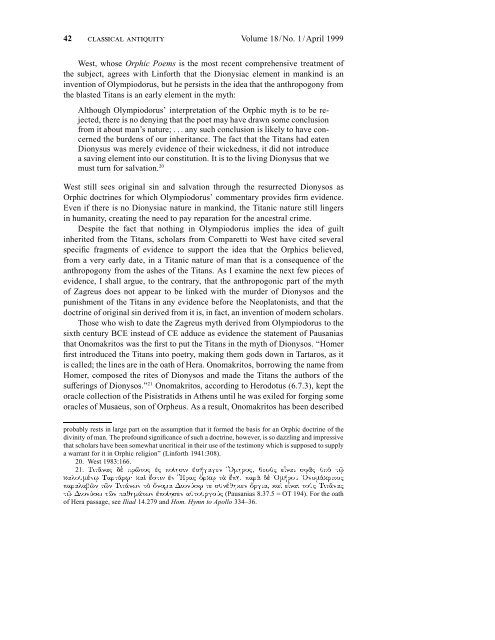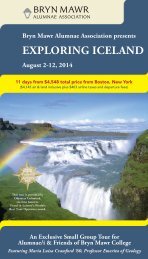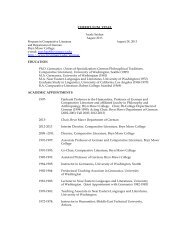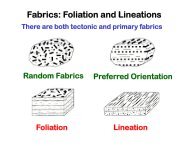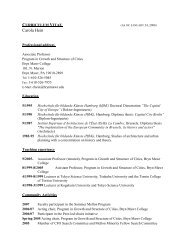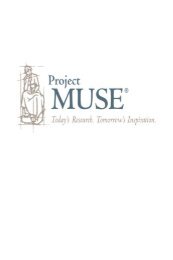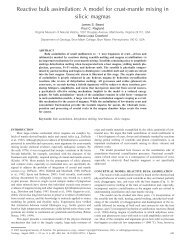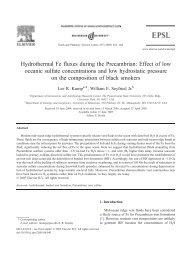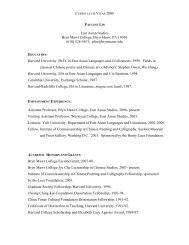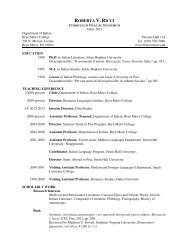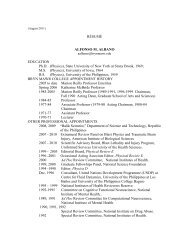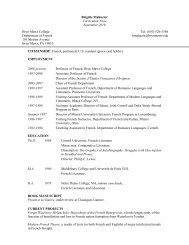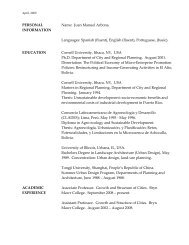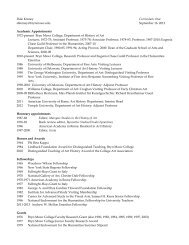Tearing Apart the Zagreus Myth - Bryn Mawr College
Tearing Apart the Zagreus Myth - Bryn Mawr College
Tearing Apart the Zagreus Myth - Bryn Mawr College
Create successful ePaper yourself
Turn your PDF publications into a flip-book with our unique Google optimized e-Paper software.
42<br />
CLASSICAL ANTIQUITY Volume 18/No. 1/April 1999<br />
West, whose Orphic Poems is <strong>the</strong> most recent comprehensive treatment of<br />
<strong>the</strong> subject, agrees with Linforth that <strong>the</strong> Dionysiac element in mankind is an<br />
invention of Olympiodorus, but he persists in <strong>the</strong> idea that <strong>the</strong> anthropogony from<br />
<strong>the</strong> blasted Titans is an early element in <strong>the</strong> myth:<br />
Although Olympiodorus’ interpretation of <strong>the</strong> Orphic myth is to be rejected,<br />
<strong>the</strong>re is no denying that <strong>the</strong> poet may have drawn some conclusion<br />
from it about man’s nature; . . . any such conclusion is likely to have concerned<br />
<strong>the</strong> burdens of our inheritance. The fact that <strong>the</strong> Titans had eaten<br />
Dionysus was merely evidence of <strong>the</strong>ir wickedness, it did not introduce<br />
a saving element into our constitution. It is to <strong>the</strong> living Dionysus that we<br />
must turn for salvation. 20<br />
West still sees original sin and salvation through <strong>the</strong> resurrected Dionysos as<br />
Orphic doctrines for which Olympiodorus’ commentary provides firm evidence.<br />
Even if <strong>the</strong>re is no Dionysiac nature in mankind, <strong>the</strong> Titanic nature still lingers<br />
in humanity, creating <strong>the</strong> need to pay reparation for <strong>the</strong> ancestral crime.<br />
Despite <strong>the</strong> fact that nothing in Olympiodorus implies <strong>the</strong> idea of guilt<br />
inherited from <strong>the</strong> Titans, scholars from Comparetti to West have cited several<br />
specific fragments of evidence to support <strong>the</strong> idea that <strong>the</strong> Orphics believed,<br />
from a very early date, in a Titanic nature of man that is a consequence of <strong>the</strong><br />
anthropogony from <strong>the</strong> ashes of <strong>the</strong> Titans. As I examine <strong>the</strong> next few pieces of<br />
evidence, I shall argue, to <strong>the</strong> contrary, that <strong>the</strong> anthropogonic part of <strong>the</strong> myth<br />
of <strong>Zagreus</strong> does not appear to be linked with <strong>the</strong> murder of Dionysos and <strong>the</strong><br />
punishment of <strong>the</strong> Titans in any evidence before <strong>the</strong> Neoplatonists, and that <strong>the</strong><br />
doctrine of original sin derived from it is, in fact, an invention of modern scholars.<br />
Those who wish to date <strong>the</strong> <strong>Zagreus</strong> myth derived from Olympiodorus to <strong>the</strong><br />
sixth century BCE instead of CE adduce as evidence <strong>the</strong> statement of Pausanias<br />
that Onomakritos was <strong>the</strong> first to put <strong>the</strong> Titans in <strong>the</strong> myth of Dionysos. “Homer<br />
first introduced <strong>the</strong> Titans into poetry, making <strong>the</strong>m gods down in Tartaros, as it<br />
is called; <strong>the</strong> lines are in <strong>the</strong> oath of Hera. Onomakritos, borrowing <strong>the</strong> name from<br />
Homer, composed <strong>the</strong> rites of Dionysos and made <strong>the</strong> Titans <strong>the</strong> authors of <strong>the</strong><br />
sufferings of Dionysos.” 21 Onomakritos, according to Herodotus (6.7.3), kept <strong>the</strong><br />
oracle collection of <strong>the</strong> Pisistratids in A<strong>the</strong>ns until he was exiled for forging some<br />
oracles of Musaeus, son of Orpheus. As a result, Onomakritos has been described<br />
probably rests in large part on <strong>the</strong> assumption that it formed <strong>the</strong> basis for an Orphic doctrine of <strong>the</strong><br />
divinity of man. The profound significance of such a doctrine, however, is so dazzling and impressive<br />
that scholars have been somewhat uncritical in <strong>the</strong>ir use of <strong>the</strong> testimony which is supposed to supply<br />
a warrant for it in Orphic religion” (Linforth 1941:308).<br />
20. West 1983:166.<br />
21. Tit naj dà prÀtoj âj poÐhsin âs gagen ‡Omhroj, qeoÌj eÚnai sf j Ípä tÀú<br />
kaloumènwú Tartˆrwú; kaÈ êstin ân ‡Hraj írkwú t€ êph. par€ dà ÃOm rou ÇOnomˆkritoj<br />
paralab°n tÀn Titˆnwn tä înoma DionÔswú te sunèqhken îrgia, kaÈ eÚnai toÌj Tit naj<br />
tÀú DionÔswú tÀn paqhmˆtwn âpoÐhsen aÎtourgoÔj (Pausanias 8.37.5 = OT 194). For <strong>the</strong> oath<br />
of Hera passage, see Iliad 14.279 and Hom. Hymn to Apollo 334–36.


